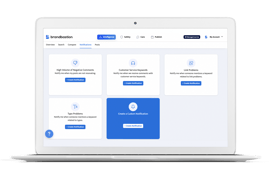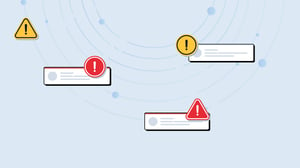
10 Critical Social Media Alerts for Brands
With a constant stream of content flooding social media, brands face the challenge of staying attuned to the nuances of online conversations, and it's easy to miss crucial updates. That's why having the right social media alerts is important for staying informed and navigating the unpredictable terrain of social media interactions.
What Are Social Media Alerts?
Social media alerts provide real-time updates on trending topics, notable mentions, and sudden changes in engagement across different platforms. These notifications offer immediate insights, helping you stay informed and adjust your social media approach as needed. Social media real-time alerts are essential to stay on top of unpredictable and urgent issues.
10 Social Media Alerts to Your Brand Needs to Set Up
1. Sensitive keywords
Businesses need to have social media mention alerts in place. They should watch out for words that could cause issues, like controversial topics about their brand.
By using social media tools, businesses can find and respond to sudden increases in these kinds of words. This helps them deal with customer worries quickly and stop their reputation from getting hurt. For instance, a company might see a lot of bad talk about a product after a recall. They can then give updates, deal with worries, and show how they're handling the crisis.
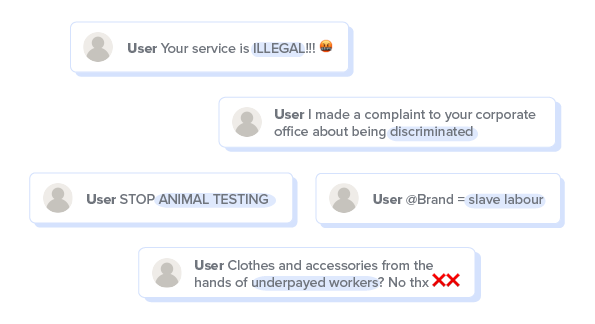
2. Volume spikes
Volume spikes in social media alerts can happen for different reasons. These could include viral marketing campaigns, product recalls, or crisis situations. To handle these spikes well, businesses can use automated monitoring tools to check when volumes spike abnormally. It's really important for businesses to address volume spikes quickly to prevent any negative impact on their brand reputation and customer satisfaction.
By managing and addressing these spikes effectively, businesses can keep a positive online presence and create stronger relationships with their customers.
3. Spike in negative sentiment
Businesses need to leverage sentiment analysis to keep up with online conversations. A rise in negative sentiment can be caused by many reasons, including product recalls, customer service issues, or negative press coverage. It's important for businesses to listen to social media and quickly address any negative sentiment. This can be done by using monitoring tools and having clear protocols for responding to negative feedback.
4. Severe events
Severe events mentioned on social media can include reports of safety, health issues, severe allergy reactions, and other alarming events. Actively monitoring and analyzing severe events helps businesses protect their reputation. It also demonstrates their commitment to customer satisfaction and safety.
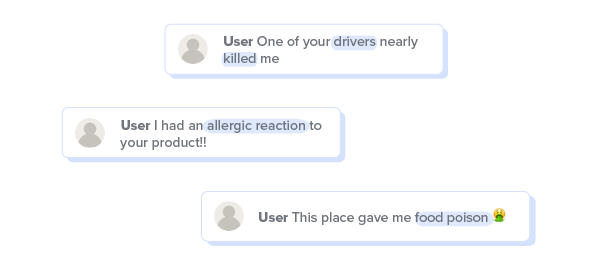
5. Broken Links
Businesses need to be aware of different types of broken links mentioned in social media alerts. These issues can harm a company's online presence and waste valuable ad spend. They can frustrate potential customers and cause them to lose trust in the brand. Quickly addressing broken links is important to show a commitment to providing a seamless online experience and maintaining a positive reputation.

6. Typos
Typos in social media alerts can impact a company's online reputation. Effective management of typos can maintain a positive brand image and credibility. One best practice is acknowledging the mistake and taking immediate action to correct it. Depending on the situation, using humor or creativity to address typos in a lighthearted manner can show the human side of the company.

7. Self-Harm
Identifying comments from users in need of immediate help who mention or imply self-harm intentions is a critical aspect of social media monitoring. Quick responses and appropriate interventions can make a significant impact on individuals' well-being.

8. Threats
Comments containing credible threats against your company, representatives, locations, or online properties, including hacking threats or attempts, demand swift attention. Timely responses and collaboration with appropriate authorities are essential to safeguard your brand and its stakeholders.
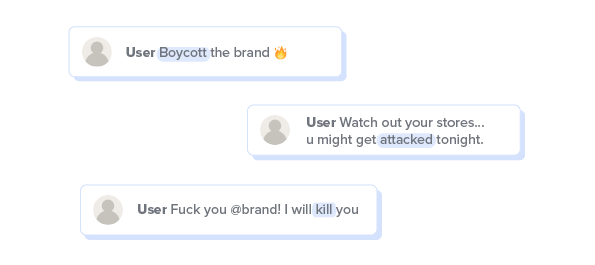
9. Brand Impersonations
Flagging instances of brand impersonation is crucial for maintaining your brand's identity and protecting it from potential misuse. Rapidly addressing these cases helps mitigate the risks associated with false representation.
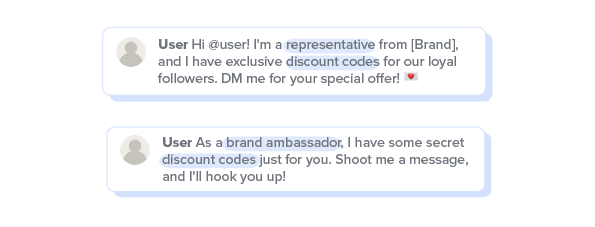
10. Inventory Mentions
Keeping track of comments mentioning product stock, questions, complaints, and users' difficulty finding specific items is vital for customer satisfaction. Proactive management of inventory-related issues ensures a positive customer experience and helps maintain a reputable brand image.

The Most Comprehensive Social Media Alerts Tool: BrandBaston
Many social media monitoring tools will have alert functionalities. BrandBastion offers comprehensive social media monitoring alerts. The alerts can also reviewed by humans before being issued to ensure higher accuracy.
Here are some key alerts BrandBastion tracks across social media channels:
- Negative and Positive Sentiment Spikes: Detects sudden surges in negative or positive sentiment on your posts, helping you gauge audience reactions effectively.
- Brand Impersonation: Flags instances of brand impersonation, ensuring you can address and mitigate potential identity threats promptly.
- Sensitive Topic Surges: Monitors spikes in specific sensitive topics, such as political discussions, allowing you to track and manage potential controversies.
- Competitor Mentions: Tracks mentions of your brand competitors, enabling you to stay competitive and responsive in your industry.
- Threat Detection: Identifies comments containing credible threats against your company, representatives, locations, or online properties, including hacking threats or attempts.
- Severe Events Monitoring: Alerts you to comments reporting safety, health issues, harassment, or fear involving your products, services, or representatives.
- Post Issues Detection: Highlights comments pointing out issues with your posts, such as audio or link malfunctions, spelling mistakes, or grammar errors.
- Allegations of IP Misuse: Flags comments where users allege that your company may be infringing on someone else's intellectual property rights.
- Self-Harm Alerts: Identifies comments from users in need of immediate help who mention or imply self-harm intentions.
- Protest Alerts: Notifies you of comments detailing real-life protests against your brand or attempts to organize one.
- Creative Not Resonating: Monitors comments where users express dissatisfaction with the ad's message, citing insensitivity or misalignment with the brand.
- Inventory Concerns: Keeps track of negative and neutral comments regarding product stock, questions, complaints, and users' difficulty finding specific items.
- HR and Factory Practices Monitoring: Alerts you to comments discussing HR or factory practices, providing insights into public perceptions of your company's workplace environment.
BrandBastion's robust AI + Human tagging system ensures that you stay on top of various categories, allowing you to navigate the social media landscape with precision.
Best Practices for Responding to Social Media Alerts
1. Prioritize by impact
One effective method for prioritizing social media alerts by impact is to establish clear ranking criteria. This can be based on the potential reach and influence of the alert. For example, a severe event might have a higher priority than a typo for most brands.
Businesses can use monitoring tools to track the frequency and severity of alerts. This can help them identify patterns and prioritize accordingly.
To manage social media alerts effectively, businesses should establish clear response protocols. They should also designate a team or individual responsible for monitoring and addressing alerts in a timely manner.
2. Have a crisis plan in place
A crisis plan for social media alerts should have:
- Designated roles and responsibilities for team members
- A clear communication strategy
- Established protocols for monitoring and responding to alerts
To effectively implement and manage this plan, a business can:
- Use social media listening tools to monitor online conversations
- Establish a designated crisis response team
- Regularly conduct drills and training exercises for preparedness
Best practices for responding to social media alerts during a crisis:
- Acknowledge the issue
- Provide timely updates
- Be transparent with the public
- Have pre-drafted messages and templates for consistent and accurate responses
Maintaining a calm and empathetic tone in communications can help mitigate potential damage to the brand's reputation.
3. Always get ahead of the problem
Businesses need to be proactive in addressing social media alerts. This involves responding promptly and professionally to comments, messages, and reviews. Best practices include addressing the issue directly, offering a solution or apology, and moving complex conversations offline.
This proactive approach helps businesses maintain a positive online reputation.
4. Act fast
Businesses should monitor social media for mentions of their brand, products, or industry keywords. This helps them keep track of what people are saying and respond to comments quickly.
To do this effectively, they can use social media management tools that cover multiple platforms. Businesses should also have clear protocols for responding to different types of alerts, like complaints or inquiries.
When responding, it's best to acknowledge the customer's concerns, offer helpful information, and maintain a positive and professional tone. Being transparent and honest, especially when addressing negative feedback, is crucial.
Wrapping up
Top Social Media Alerts cover several areas that businesses and individuals should monitor and manage their social media presence. Setting up these alerts helps individuals and businesses stay informed and responsive to online conversations and trends.
Get started with BrandBastion notifications
Facebook, Instagram, Youtube, TikTok Ads & Organic covered (including FB Dynamic Ads)START FREE TRIAL
